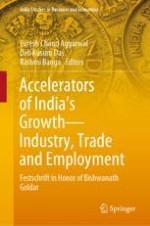2020 | OriginalPaper | Buchkapitel
Increasing Dualism in Indian Wage Labour Market
verfasst von : Sandip Sarkar, Balwant Singh Mehta
Erschienen in: Accelerators of India's Growth—Industry, Trade and Employment
Verlag: Springer Singapore
Aktivieren Sie unsere intelligente Suche, um passende Fachinhalte oder Patente zu finden.
Wählen Sie Textabschnitte aus um mit Künstlicher Intelligenz passenden Patente zu finden. powered by
Markieren Sie Textabschnitte, um KI-gestützt weitere passende Inhalte zu finden. powered by
